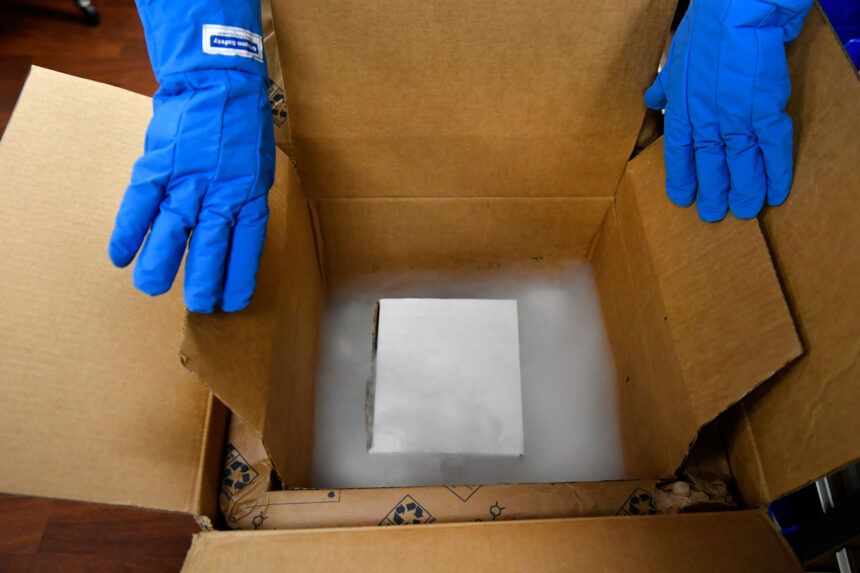Daily reported deaths from Covid-19 top 3,000 for the first time

(CNN) -- The United States for the first time reported more than 3,000 Covid-19 deaths on Wednesday, according to data compiled by Johns Hopkins University.
So far on Wednesday, 3,049 have been reported, according to Johns Hopkins. The numbers are not complete for the day.
The United States is averaging about 2,230 new death reports per day, the university's data shows.
Over the course of the pandemic, US health officials have reported 289,298 total deaths.
Some hospitals are running out of room in the ICU
In states across the nation, officials remain concerned about the number of Covid-19 patients in the hospital and the ability of hospitals to find enough rooms.
California on Wednesday set records in cases, hospitalizations and ICU admissions. The most populous state has only about 1,500 ICU beds available.
Fresno County's Interim Public Health Officer Dr. Rais Vohra reported zero ICU capacity Tuesday.
"Whenever the ICUs get full, it's really hard to move patients through the emergency department. It's really hard for us to provide efficient services," said Vohra, a specialist in emergency medicine.
The state has mandated restrictions for five regions if ICU capacity goes below 15%. The greater Sacramento region reached the threshold Wednesday and a stay-at-home order for 3 million residents will begin late Thursday.
"I know that those who aren't in the medical field may not understand or quite grasp just how dire the situation is, but all the things you're hearing about -- how impacted our hospitals are, about how dire the situation with our ICUs is -- it's absolutely true. And that really is the reason that we want everyone to stay home as much as possible," Vohra said.
Oklahoma facilities had just 34 available ICU beds as of late Tuesday.
Other states that reported record hospitalizations Wednesday include North Carolina, Pennsylvania and West Virginia.
In the United States, Covid-19 cases, hospitalizations and cases have soared. Wednesday saw a record 106,688 patients in hospitals, according to the COVID Tracking Project.
The US has averaged 206,152 new cases a day over the past seven days -- the country's highest average in the pandemic so far. On Wednesday, at least 216,155 cases were announced.
More than 15.3 million official Covid-19 cases have been reported, according to data from JHU, though researchers believe the actual number of infections is much higher.
Canada approves vaccine as US prepares decision
Canada's health department on Wednesday gave emergency approval to a coronavirus vaccine, a day before the US Food and Drug Administration is due to meet about whether to do the same.
Health Canada determined the Pfizer/BioNTech vaccine for Covid-19 meets the department's safety, efficacy and quality requirements for use in Canada, the department said Wednesday. The decision comes a week after the United Kingdom authorized vaccine use there.
Further details from Health Canada are expected to be announced later Wednesday, but Canadian Prime Minister Justin Trudeau said this week that Canada would receive an initial shipment of 249,000 doses by the end of the year and expected Canada's first vaccinations to occur sometime next week.
In the United States, meanwhile, an official said Covid-19 vaccines would be distributed to vulnerable populations within days of any decision to authorize them.
The FDA will meet Thursday to discuss whether to grant emergency use authorization (EUA) for the Pfizer/BioNTech vaccine candidate in the US. A decision could come within days of that meeting, officials say.
The meeting comes as coronavirus hospitalizations in the US and average daily cases are at an all-time high.
After any EUA is made, "we will start to have shots in arms within 96 hours" of that decision, Gen. Gustave Perna, chief operating officer of the federal government's Operation Warp Speed vaccine initiative, said Tuesday. "That's what I believe with all my heart."
The FDA also intends to deliberate on a separate vaccine candidate, from Moderna, in eight days.
Assuming the vaccines are approved, "20 million people should get vaccinated in just the next several weeks," US Health and Human Services Secretary Alex Azar told CNN on Wednesday.
Governors are prioritizing who would get the vaccines first in their states, though health care workers and the most vulnerable, including residents of long-term care facilities, are expected to be first in li
If vaccine authorizations happen as hoped -- including potentially for other manufacturers early next year -- the wider US public could start to see vaccines available in February and March, Azar told CNN's "New Day" Wednesday.
The White House coronavirus task force has warned that current vaccination plans wouldn't reduce the spread of Covid-19 until at least late spring.
UK asks people with severe allergies to abstain from Pfizer vaccine for now
People with a "significant history of allergic reactions" should not be given the Pfizer/BioNTech coronavirus vaccine, UK health authorities said Wednesday, after two health care workers had allergic reactions.
The UK, which already has approved the vaccine, began administering it to thousands of people there on Tuesday.
The new precautionary advice on allergies was given after two health care workers "responded adversely" following their shots Tuesday, National Health Service England said Wednesday.
The two recipients had an unspecified history of allergic reactions, and both carried adrenaline autoinjectors. Both are recovering, officials said.
But because of the two incidents, "any person with a history of a significant allergic reaction to a vaccine, medicine or food (such as previous history of anaphylactoid reaction or those who have been advised to carry an adrenaline autoinjector) should not receive the Pfizer BioNTech vaccine," the UK's Medicines and Healthcare products Regulatory Agency said in new advice Wednesday, according to PA Media.
The MHRA said it will issue updated advice once it reviews the two cases. Pfizer issued a statement saying it was supporting the investigation.
Azar, the US health and human services secretary, said he wants to make sure the FDA examined the UK allergic reaction data when it discusses the Pfizer vaccine Thursday.
"FDA is not going to cut any corners," Azar told CNN Wednesday.
People with a history of severe reactions to vaccines were not included in its vaccine trial, according to Pfizer data released by the FDA on Tuesday.
Dr. Paul Offit, a vaccine expert at Children's Hospital of Philadelphia, told CNN that roughly one of every 1.4 million vaccine doses in the US is complicated by a severe allergic reaction.
In the case of the Pfizer vaccine, he said it will be important for UK officials to find out exactly what component of the vaccine caused the reactions in the two patients, so that the country could offer tailored guidance rather than a "blanket recommendation."
Pull together for holiday season, experts say
As Covid-19 hospitalizations increase, doctors and nurses around the country are warning that they're low on space and energy to take care of patients.
And some states and communities are responding by ramping up or extending social restrictions.
In Alabama, Gov. Kay Ivey on Wednesday said she will extend the state's "safer at home" order for six weeks. That order requires people to wear face coverings while in public and in close contact with others.
As more holidays approach, Americans increasingly need to pull together to mitigate the pandemic's impacts, experts have said.
The US already was recording 40,000 to 70,000 new coronavirus cases daily in September and October, before a severe fall surge picked up in November -- and spread from Thanksgiving gatherings will result "in a surge upon a surge," Dr. Anthony Fauci, the director of the National Institute of Allergy and Infectious Diseases, said.
Families and friends gathering for Christmas and Hanukkah could add another spike to the mix, making impacts of the pandemic even worse in December and January, Fauci said Tuesday in a discussion with the National Urban League.
"We're going to be asking people to do something that is difficult and maybe even painful, particularly at the family level, is to tell people, unless it's absolutely necessary, not to travel," he said. "We said that over Thanksgiving and we're saying the same thing over Christmas."
The-CNN-Wire
™ & © 2020 Cable News Network, Inc., a WarnerMedia Company. All rights reserved.

